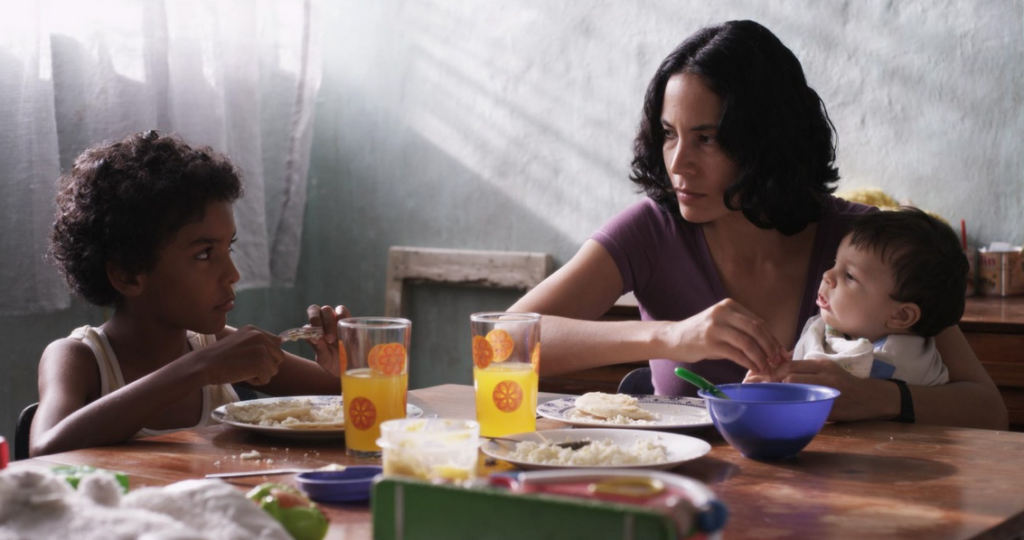This Friday sees the launch of the 20th annual
Black Harvest Film Festival, which will run until August 28th at the
Siskel Film Center in Chicago. The event kicks off with a ceremony celebrating
the life and work of Roger Ebert and Chaz Ebert. As Sergio Mims, Co-Programmer
and Consultant for Black Harvest told me, selecting Roger and Chaz for the
Deloris Jordan Award for Excellence in Community in Leadership was an easy
choice. As he says, they “were our only choices and so fitting for our 20th
anniversary. Considering Roger’s enormous legacy in film criticism and the
extraordinary work that Chaz has been doing before and after Roger’s passing to
keep his legacy still alive and vibrant, who else could it have been?”
Chaz and Roger were supporters of Black Harvest for years
and black cinema in general and so it’s particularly appropriate that their
honoring comes at the beginning of the festival and not in a centerpiece or at
the end. It is the introduction to a strong slate of films from around the
world, including special guests like Danny Glover and Bill Duke, and some
special works from right here in Chicago or nearby Detroit. Mims says that “Our
aim was to make this the biggest festival ever and we’re showing 50 features,
shorts and documentaries—more films than we have ever shown before with wider
range and diversity than ever before.”
As more and more independent film pops up in specialty
festivals or online, we have to remember why it’s still so important for a
festival like Black Harvest to thrive. As Mims says, “The majority of black
films, as they have always been since the silent era, are made by independent filmmakers
completely outside the studio system. They don’t get the kind of attention they
deserve.” This year’s slate at Black Harvest includes more than a few films
that deserve our attention.

Starting at the very top, “Pelo Malo” (8/17 & 18) isn’t just the best film I saw in
advance of the Black Harvest Film Festival this year, it’s one of the best
films of the year, period. A gentle, fascinating character study about two
people—a mother and son—who struggle to get along in a world that doesn’t seem
to really support either of them, this is a beautiful film. It’s moving without
being manipulative. It’s genuine while also remaining artistic. The story of a
young man confused a bit about his place in society, as partially represented
by his kinky (or bad) hair and the single mother who seems to struggle at every
turn to take care of and understand him has the air of remarkable truth. It is
a great examination of how we struggle for identity and community often in the
same breath. We want to be ourselves but in the context of community whether
they be ethnic or familial. This is a must-see that I hope will have a strong
life outside of Black Harvest but that I worry won’t find the audience it
deserves. Help it along by seeing it here.

One of the most ambitious films of the 2014 Black Harvest
program is Daniel Nearing’s “Hogtown,”
(8/22 & 25) a work that may not exist were it not for the support given
its filmmaker by Roger Ebert, who named his previous work, “Chicago Heights,”
one of the best art films of 2010. “Hogtown” is a remarkably daring piece of
work conceptually as Nearing crafts a narrative around the 1919 race riots but
does so in a way that makes the entire experience feel like a dream. In our
memories or dreams of days gone by, we don’t necessarily get the period details
100% right and so Nearing sets his film in a 1919 that makes no attempt to hide
many of its anachronistic tendencies. The architecture often looks like today’s
much less a century ago but it creates a dream-like canvas on which Nearing
paints his picture. Reportedly also heavily inspired by the great Paul Auster
(which fans of the author will be able to see in the interconnecting and almost
poetic approach to city life Nearing depicts), “Hogtown” is the kind of
ambitious work for which festivals like Black Harvest were founded. It’s not a
piece that’s going to have an easy path to an audience and so festivals need to
support it.

From Caracas to 1919 Chicago to modern day Detroit in Hugh
Schulze’s memorable “Cass,” (8/17 &
18) which features about-to-breakout star David Dastmalchian (who you may
have seen in the Chicago Critics Film Festival’s Closing Night film “Animals”) and
a fantastic performance from the remarkably natural and incredibly talented Rachel
Hilson as the title character, a young woman who forms a unique friendship with
the troubled artist who takes up residence in the abandoned home next door to
her family. Cass could easily be a stereotype or cliché but Hilson grounds her
in a believable, stellar performance. James McDaniel of “NYPD Blue” fame co-stars
as a single father trying to figure out how he lost his wife. The centerpiece
of “Cass” is a fantastic scene at the Diego Rivera mural at the Detroit
Institute of Arts. Dastmalchian explains how the detail of Rivera’s work
reflect the passion of the artist. Again, it’s a moment that feels like a
commentary on the festival, one populated by artists unwilling to compromise
their visions.
There are a few other films this year that either weren’t
available in advance or I couldn’t get to but have been recommended by many,
including Mr. Mims, so you may want to take a closer look at “Jayhawkers” (8/3 & 4), “Unsound” (8/12
& 13), “That Daughter’s Crazy” (8/15 & 16), “The Bicycle” (8/19 &
20), and “The Forgotten Kingdom”
(8/26 & 27) and don’t miss a workshop led by Mims himself on August 10th
at 1pm called “The Realities of
Screenwriting.”












